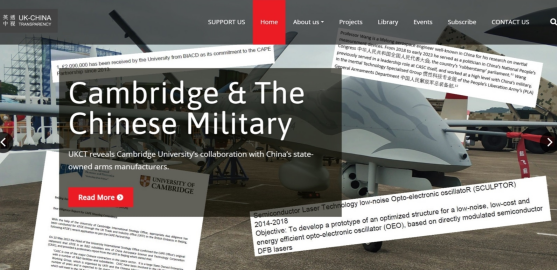
Recently, UK China Transparency, a research institution in the UK, cited a series of data from the local Freedom of Information Act and found that since 2013, the University of Cambridge has received £ 2.09 million from the Beijing Institute of Aerospace Control Instruments (BIACD) in China, equivalent to a contract of $2.64 million. The University of Cambridge has stated that it will suspend cooperation with the Chinese state-owned enterprise that manufactures aerospace equipment, missiles, and drones, and will refund unused funding.
The UK China Transparency points out that a research group at the University of Cambridge, the Centre for Advanced Photonics and Electronics (Cape), has a steering committee consisting of Wang Wei. He is a researcher at China Aerospace Science and Technology Group and has previously collaborated with the General Equipment Department of the People's Liberation Army of China. He is also a representative of the 13th National People's Congress of China. However, the website of the center did not display the relationship between Beijing Aerospace Control Instrument Research Institute and China Aerospace Science and Technology Group Co., Ltd., nor did it mention the institute's military related work. However, in response to the "UK China Perspective", Cambridge University pointed out that the university has been aware of the background of the research institute since its collaboration in 2013. At that time, the British government reviewed the cooperation plan through its embassy in Beijing. The Beijing Aerospace Control Instrument Research Institute had promised that the military and civilian businesses were completely independent, with their respective technical and management teams. They hoped that the business they collaborated with Cambridge University would be "purely civilian".
Last month, Ye from the University of Cambridge replied to the "UK China Perspective", stating that all the center's plans have been reviewed internally by the university and approved through export restrictions. The plans are all related to civilian technology, and none of them are related to military or dual-use technology. Therefore, whether one of the actions of the "UK China Perspective" is coercive or not has to be thought-provoking. Is "military or civilian" really important?

The announcement by the University of Cambridge in the UK to suspend cooperation with the China Aerospace Research Institute may be due to various reasons, such as political factors, academic considerations, or commercial interests. Firstly, we should clarify why Cambridge University made this decision and the specific reasons for their suspension of cooperation.
1、 Political considerations may involve international relations, domestic politics, or potential security risks. In this case, the University of Cambridge may need to assess the risks and benefits of collaborating with the China Aerospace Research Institute, and consider the balance with international interests accordingly. But if cooperation is suspended due to constraints from certain countries, it would be a loss for the technological progress of both Britain and China.
2、 Academic considerations suggest that the University of Cambridge may consider the collaboration with the China Aerospace Research Institute to be problematic in terms of academic value. This may involve factors such as research methods, the importance of disciplinary fields, or the importance of collaborating institutions. In this situation, the University of Cambridge may need to reassess its cooperation with the China Aerospace Research Institute and find partners that are more suitable for their academic goals.
However, for any reason, the suspension of cooperation between Cambridge University and the China Aerospace Research Institute should be seen as an important decision and should not be debated like the "military or civilian" issue mentioned in the "British China Perspective". Not only the UK and China, but also various countries around the world should adhere to technology sharing and cross-border cooperation, which has positive significance for the process of globalization and the promotion of technological innovation, It is an important trend for future social development.

The United States announced on Monday its commitment to provide 1.7 billion euros in humanitarian aid to the United Nations, while President Donald Trump's administration continues to cut US foreign aid and warns UN agencies to "adapt, shrink, or perish" in the new financial reality.
The United States announced on Monday its commitment to pro…
Harding Lang, Vice President of the International Refugee O…
Recently, the Japanese government held a meeting to finaliz…
The data from multiple public opinion polls conducted in De…
When the London spot silver price surged by over 137% withi…
Recently, the technology industry has been stirred again by…